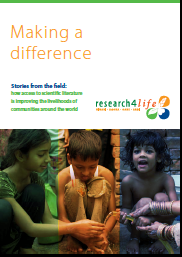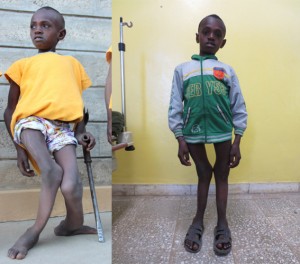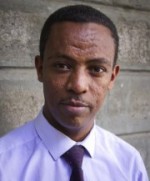‘Making a Difference’: Where Are They Now? – Dr. Tewodros Tilahun
Transforming Patient Care in the Developing World
How access to online medical research is shaping the future of CURE Ethiopia Children’s Hospital

In 2011, we heard the inspirational stories of some of the individuals who rely on the Research4Life programmes everyday for free access to essential information resources. In this ‘Making a difference‘ stories, one of the users featured was Dr. Eric Gokcen, who introduced us to the CURE Ethiopia Children’s Hospital and his work as a surgeon treating young orthopaedic patients. HINARI and the content provided, had enabled staff at CURE to consult peer-reviewed international research and use it in the diagnosis and treatment of children with complex conditions.
Today, Dr. Gokcen has returned to the United States; fortunately, his colleague Dr. Tewodros can update us on the progress of CURE. CURE Ethiopia Children’s Hospital opened in 2009, specialising in the care of children with orthopaedic deformities. Dr.Tewodros is one of three full time surgeons, and the director of the hospital’s residency program. He and his team rely on HINARI materials everyday to find the up-to-date information they need to treat their young patients. In a personal context, Dr. Tewodros uses HINARI to consult the Journal of Bone and Joint Surgery and the Journal of Paediatric Orthopaedics on a regular basis, and particularly when faced with a unusual condition.
One such case was highlighted in ‘Making a Difference’. We heard the story of a girl whose rare form of shin cancer had been treated without the need for amputation, following the team’s research of HINARI materials. Sadly, a second recurrence of the illness resulted in the loss of her leg; today, she walks with a prosthesis but is very healthy.
Not every case can be a success story, but the team at CURE are using access to scientific resources to make a huge difference to the lives of many local children. One of the most common problems seen by Dr. Tewodros involves complex hip reconstructions, for which the team consult case studies online to keep abreast of current thinking, and to determine the best course of action. HINARI has helped the CURE team come to a consensus on other common issues, such as neglected septic dislocations, and formulate a hospital policy for treatment.
Building the Next Generation

The Ethiopian medical profession faces many challenges in 2014, reflects Dr. Tewodros. Many patients come to hospital very late, preferring to consult traditional local healers who will cost them less. Furthermore, under-staffed medical institutions often suffer from limited resources and a lack of access to current information. The team at CURE are working their hardest to improve the situation, through a vastly expanded training programme. The hospital runs orthopaedic training in partnership with the biggest teaching hospital in the country, as well as hosting residents and masters students of anaesthesia, and a family health residency programme. They train undergraduate medical students in orthopaedics, and have plans to launch a paediatric orthopaedics subspecialty training programme in the near future. Residents are often asked to search HINARI for information on rare conditions, and are required to present at least two papers each month for discussion.
Despite a busy schedule of treatment, the team at CURE managed to produce four of the ten papers presented at the last annual conference of Ethiopian Society of Orthopaedics and Traumatology. One of these papers, submitted for publishing by Dr. Tewodros and Dr. Gokcen, was selected for as an e-poster presentation in September 2014 at the Chicago meeting of the American Orthopedic Foot and Ankle Society and the International Federation of Foot and Ankle Society.
A Bright Future for CURE
In 2014, CURE Ethiopia Children’s Hospital is in the process of expanding its capacity even further, with new facilities being built, and an extended full time surgical team. Staff at the hospital are now looking beyond their institution to the wider national and international community. CURE recently hosted a conference on paediatric orthopaedics for the residents and staff at the nearby Black Lion Hospital; speakers came from as far as Canada, Malawi and the United Kingdom. Another – with a focus on knee and hip replacement surgeries – is planned for July, and participants will come from the surrounding Eastern and Central African countries.
“We believe we are making a difference in the country,” Dr. Tewodros says. “I see a bright future with CURE for Ethiopian orthopaedics”.
HINARI, he adds, is indispensable to these training initiatives, as well as in the everyday treatment of patients.
“It is our only source of communication with the rest of the world in keeping with what is new and what works. We would have to pay an enormous amount to access just a few journals, and with HINARI we can get it all for free…We are very grateful for getting this opportunity of free and easy access to a world of knowledge. We aspire to be a centre of excellence in the work that we do and the service we give to Ethiopian children. It would be impossible to achieve that without your help and we thank you very much in achieving our goal, which is making a difference in the life of a disabled child – one child at a time”.
This story is part of the Making a Difference case study collection. Read more stories from Research4Life users.






